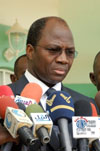
Despite the near unprecedented gathering of Darfuri rebel groups in Doha for peace talks, disorganization and lack of leadership on the part of the African-Union and United Nations-led mediation team has hindered the potential for a new peace agreement. Current negotiations in Doha have convened the largest gathering of rebel groups since talks in Abuja, Nigeria that led to the ill-fated Darfur Peace Agreement. This is a historic moment that international, UN, and AU mediators must seize upon.
Negotiations to jump-start a new Darfur peace agreement came together in late January, with the media optimistically reporting that a majority, or 60 percent, of rebel groups had chosen to participate. Currently, all major rebel groups, except for a faction led by the infamously intransigent Abdel-Wahid Al-Nur, are present. Nonetheless, rebel groups are unable to reach a unified position to present to the Sudanese government in negotiations.
As with prior attempts toward peace in Darfur, international mediators have failed to articulate clear goals for the fractious rebel parties. Instead of presenting a document on the actual content of a potential agreement, the mediation team instead put forward points on the negotiation process. It is essential the mediators take advantage of the potential opportunity to table a draft peace agreement that includes the demands of all parties involved—particularly those of civil society.
Consultations between civil society and rebel groups—set to take place prior to official talks—were cancelled because of objections from the Chadian-based rebel group Justice and Equality Movement, or JEM. Khalil Ibrahim, JEM’s commander, continues to demand bilateral negotiations with Khartoum and objects to civil society demands that he claims could replace those of rebels. Disappointingly, the AU-UN mediation team agreed to JEM’s demand, first delaying then outright cancelling the consultations. This willingness to swap civil society representation for rebel cooperation is indicative of the mediation’s short-sightedness and is a serious setback for the goal of truly inclusive peace talks.
International mediators must seize the opportunity for a durable agreement. Not only have the majority of Darfuri rebels assembled, the elections in April give the mediation team the upper hand in negotiations with Khartoum, which desperately wants international validation of its elections results. But, without strong leadership and a clear agenda that has the welfare of the larger Darfuri population at its core, the moment for peace will quickly pass.
Photo: Chief mediator Djibril Bassole

